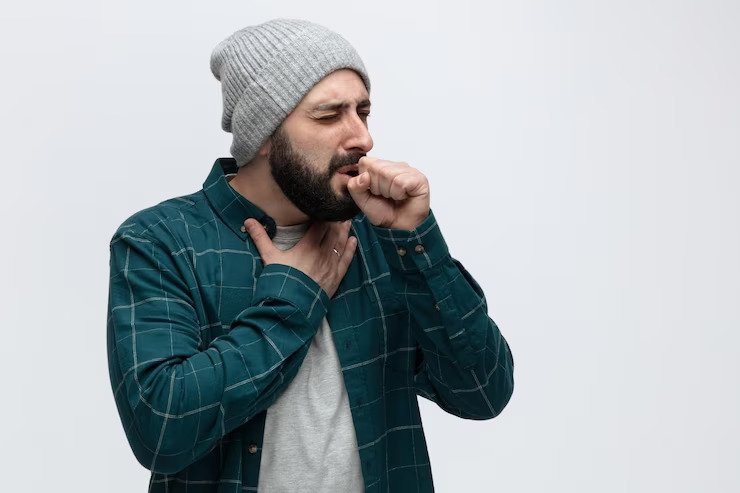Preventive Healthcare
Whooping Cough - Symptoms, Causes and Treatments
2092 Views
0

A severe respiratory infection known as pertussis, or whooping cough, is brought on by a type of bacteria known as Bordetella pertussis. It is characterised by severe and unmanageable coughing that makes breathing difficult. Although whooping cough is common across all age groups, children and infants can feel its consequences the most. It is important to identify the key symptoms and causes of whooping cough and seek the right care.
What are The Symptoms of Whooping Cough?
Individuals can experience the symptoms of whooping cough within 5-10 days of being exposed to the Bordetella pertussis bacteria. In some cases, symptoms may show up weeks later. All the usual signs of a cold are seen right before whooping cough, including:
- Slightly high temperature
- Sneezing
- Itchy and wet eyes
- Runny nose
- Gasping for breath
- An irregular cough
- Recurring dry coughs
- Pale skin and lips
In some severe cases, the symptoms are:
- A high-pitched vocal sound, followed by fits of frequent coughing
- Coughing bouts followed by or during vomiting
- Fatigue after repeated coughing episodes
People may notice that their coughing fits intensify and become more regular, particularly at night. This can happen for weeks at a stretch. As a result, those affected by whooping cough may show signs of sleep deprivation. It takes many weeks for the severity and frequency of coughs to lower. However, if one suffers from another respiratory infection during this period, the signs of whooping cough can worsen.
Symptoms for Babies
Infants affected by whooping cough may have more severe symptoms, such as temporarily paused breathing. One may notice a bluish hue on the skin of infants suffering from whooping cough. Whooping cough symptoms might resemble those of other medical diseases. Be sure to consult a doctor.
Different Stages of Whooping Cough
- 1st stage: The initial whooping cough stage might persist for one to two weeks. The symptoms during this period are similar to those of a typical cold. The bacterial infection is at its most severe form during this stage.
- 2nd stage: During this stage, intense and violent coughing fits appear. People are frequently gasping for air, spitting, and even crying between multiple bouts of coughing. In some cases, severe coughing episodes may accompany vomiting and acute tiredness. The second stage of whooping cough can last up to six weeks, sometimes as long as ten weeks. Most individuals are still quite infectious for the first few weeks of this stage.
- 3rd stage: The cough starts to get better at this point. This is the final stage, where people are generally not infectious anymore. It can last anywhere from one to three weeks. Taking good care of oneself during this time is important, as any infection can stop whooping cough recovery.
What Causes Whooping Cough?
Whooping cough is caused by a kind of bacterium called Bordetella pertussis. Small droplets containing whooping cough germs may travel through the air when an affected person coughs, sneezes, or even laughs. Those who are exposed to bacteria-containing air droplets can get whooping cough.
Once the bacteria enter a person's respiratory system, they get attached to the fine hairs on the lining of the lungs. The harmful bacteria multiply and stop a person’s ability to clear mucus during the infection.
As a result of the bacterial infection, individuals experience respiratory inflammation, which shows up as symptoms of a common cold. This is because the windpipe (trachea) has acute inflammation.
The illness caused by whooping cough affects people across all age groups. In some cases, even individuals who have received adequate vaccinations might fall prey to the ailment.
If you are close to someone with a weak immune system and who suffers from colds regularly, it is important to protect yourself from their sneezes and coughs.
Treatment for Whooping Cough
Certain steps can reduce the severity of the bacterial infection that leads to a person getting whooping cough.
- Getting blood and mucus tests: It is important to confirm that one has whooping cough before seeking treatment. The first step is doing blood and mucus tests. Medical professionals generally swab the back of one’s throat to get some mucus.
- Seeking early treatment: Individuals who suspect they are being affected by whooping cough should visit a doctor as soon as possible. If you are worried that a child in your family might be affected, get them tested immediately. Children are more vulnerable to whooping cough and experience worse symptoms.
- Antibiotic treatment: Antibiotics are commonly used to treat whooping cough and might lessen the ailment's intensity and boost recovery. However, the effect of antibiotic treatment might not be much if a person lets the cough persist for many weeks.
- Prescribed cough medication: Some individuals may experience a temporary reduction in throat discomfort by taking cough medication. However, this should be done only after consulting a doctor.
Preventive Measures for Whooping Cough
The most effective defence against whooping cough is vaccination. Adults without tetanus and diphtheria booster shots (Td) are advised to get the Tdap pertussis booster vaccine. It is important to note that even vaccines may not be enough after many years as they lose their effectiveness. So, both children and adults should take extra care to protect themselves against bacterial exposure.
Even if you haven't experienced a persistent cough, schedule a visit with your doctor if you believe you may have come into contact with someone who has whooping cough.
Conclusion
Whooping cough is a common but severe ailment affecting millions worldwide annually. Knowing about its symptoms, causes, and treatments can be quite helpful for one’s respiratory well-being.
 Home Visit
Home Visit Upload
Upload














1701259759.webp)









 WhatsApp
WhatsApp